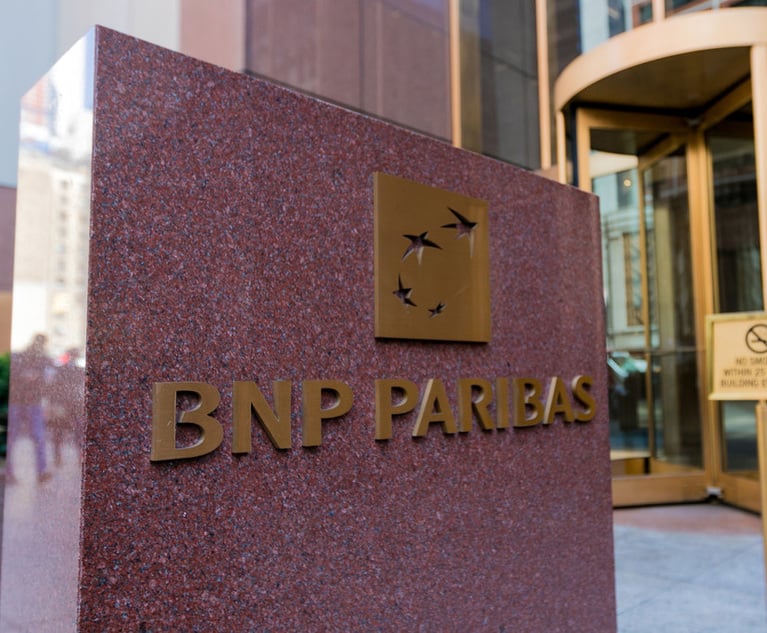 Photo: Sittinan via Adobe Stock
Photo: Sittinan via Adobe Stock Should the United States Be the Global Financial Policeman? International Extradition of White-Collar Defendants
The United States needs to consider carefully whether its treaty advantages and broad jurisdictional statutes should be aggressively used to bring foreign defendants to the United States when the American interest is limited and when other countries may have a greater interest in applying their own statutes, and their own penalty structures.
March 26, 2021 at 02:40 PM
8 minute read
Extradition agreements date from the early days of formal legal systems. The first known agreement originated as part of a peace treaty between an Egyptian Pharaoh and a Hittite King. Such agreements reflected the reality that criminal codes and legal systems generally operated territorially and that criminal defendants had both an incentive and ability to evade responsibility with their feet—by fleeing to another jurisdiction, where they could not be tried.
The Jay Treaty of 1794 was the first treaty arrangement governing extradition between Great Britain and its recently liberated colony across the Atlantic. It contained concepts that are central to extradition today, including requirements that extradition requests be based on law rather than foreign policy considerations or politics. Subsequent treaties delineated recognized common law crimes like murder, arson, piracy, armed robbery and the like, with a clear act requirement that could be pinpointed in time and place.
This content has been archived. It is available through our partners, LexisNexis® and Bloomberg Law.
To view this content, please continue to their sites.
Not a Lexis Subscriber?
Subscribe Now
Not a Bloomberg Law Subscriber?
Subscribe Now
NOT FOR REPRINT
© 2025 ALM Global, LLC, All Rights Reserved. Request academic re-use from www.copyright.com. All other uses, submit a request to [email protected]. For more information visit Asset & Logo Licensing.
You Might Like
View All
The CFPB Is Digging In for Last Days of Biden's Term. But What Happens Next?
6 minute read

NY AG James Targets Crypto Fraud Which Allegedly Ensnared Victims With Fake Jobs
4 minute read
'Merciless' Filing Deadline Dooms Cuban Americans' Property-Trafficking Suit Against BNP Paribas, SocGen
4 minute readLaw Firms Mentioned
Trending Stories
- 1Lawyers: Meet Your New Partner
- 2What Will It Mean in California if New Federal Anti-SLAPP Legislation Passes?
- 3Longtime AOC Director Glenn Grant to Step Down, Assignment Judge to Take Over
- 4Elon Musk’s Tesla Pay Case Stokes Chatter Between Lawyers and Clients
- 5Courts Demonstrate Growing Willingness to Sanction Courtroom Misuse of AI
Who Got The Work
J. Brugh Lower of Gibbons has entered an appearance for industrial equipment supplier Devco Corporation in a pending trademark infringement lawsuit. The suit, accusing the defendant of selling knock-off Graco products, was filed Dec. 18 in New Jersey District Court by Rivkin Radler on behalf of Graco Inc. and Graco Minnesota. The case, assigned to U.S. District Judge Zahid N. Quraishi, is 3:24-cv-11294, Graco Inc. et al v. Devco Corporation.
Who Got The Work
Rebecca Maller-Stein and Kent A. Yalowitz of Arnold & Porter Kaye Scholer have entered their appearances for Hanaco Venture Capital and its executives, Lior Prosor and David Frankel, in a pending securities lawsuit. The action, filed on Dec. 24 in New York Southern District Court by Zell, Aron & Co. on behalf of Goldeneye Advisors, accuses the defendants of negligently and fraudulently managing the plaintiff's $1 million investment. The case, assigned to U.S. District Judge Vernon S. Broderick, is 1:24-cv-09918, Goldeneye Advisors, LLC v. Hanaco Venture Capital, Ltd. et al.
Who Got The Work
Attorneys from A&O Shearman has stepped in as defense counsel for Toronto-Dominion Bank and other defendants in a pending securities class action. The suit, filed Dec. 11 in New York Southern District Court by Bleichmar Fonti & Auld, accuses the defendants of concealing the bank's 'pervasive' deficiencies in regards to its compliance with the Bank Secrecy Act and the quality of its anti-money laundering controls. The case, assigned to U.S. District Judge Arun Subramanian, is 1:24-cv-09445, Gonzalez v. The Toronto-Dominion Bank et al.
Who Got The Work
Crown Castle International, a Pennsylvania company providing shared communications infrastructure, has turned to Luke D. Wolf of Gordon Rees Scully Mansukhani to fend off a pending breach-of-contract lawsuit. The court action, filed Nov. 25 in Michigan Eastern District Court by Hooper Hathaway PC on behalf of The Town Residences LLC, accuses Crown Castle of failing to transfer approximately $30,000 in utility payments from T-Mobile in breach of a roof-top lease and assignment agreement. The case, assigned to U.S. District Judge Susan K. Declercq, is 2:24-cv-13131, The Town Residences LLC v. T-Mobile US, Inc. et al.
Who Got The Work
Wilfred P. Coronato and Daniel M. Schwartz of McCarter & English have stepped in as defense counsel to Electrolux Home Products Inc. in a pending product liability lawsuit. The court action, filed Nov. 26 in New York Eastern District Court by Poulos Lopiccolo PC and Nagel Rice LLP on behalf of David Stern, alleges that the defendant's refrigerators’ drawers and shelving repeatedly break and fall apart within months after purchase. The case, assigned to U.S. District Judge Joan M. Azrack, is 2:24-cv-08204, Stern v. Electrolux Home Products, Inc.
Featured Firms
Law Offices of Gary Martin Hays & Associates, P.C.
(470) 294-1674
Law Offices of Mark E. Salomone
(857) 444-6468
Smith & Hassler
(713) 739-1250






